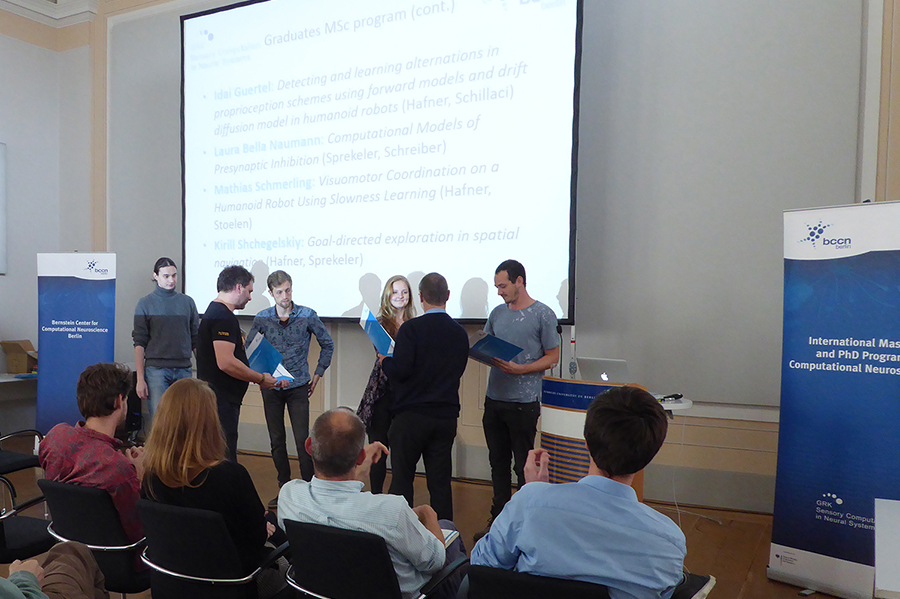International Master Program “Computational Neuroscience” successfully re-accredited
The “Master Program Computational Neuroscience”, which started in October 2006 at the Bernstein Center for Computational Neuroscience Berlin (BCCN Berlin), has successfully been re-accredited by the system accreditation commission of the Technische Universität Berlin (TU Berlin) and is accredited until June 8, 2028. The “Zentrale Evaluations- und Akkreditierungsagentur (ZEvA)” (Central Evaluation and Accreditation Agency) assigned in July 2021 the right of system accreditation to the TU Berlin. Thus, the TU Berlin can accredit their study programs with an internal commission.

Graduates of the program in 2017
The accreditation confirms the high training standards and quality of this program, which is still unique within Germany, and encourages the BCCN Berlin and the program director Professor Klaus Obermayer to continue with their commitment to establish a multi-institutional training program with outstanding teaching and infrastructure. “The program offers rigorous training in methods which are relevant for the field of human neuroscience and brain research with clinical applications as well as for the field intelligent systems with its various engineering applications. Both are cutting-edge sectors with high potential and relevance for our society. Therefore, we expect our graduates to have outstanding job perspectives in the field of research and development as well as in the area of data science and start-up founding in the free economy,” says Obermayer.
The international program has been very sought after for the last five years, offers fifteen places per year and is delivered in partnership by the three Berlin universities as well as the Charité-Universitätsmedizin Berlin. The final degree, Master of Science (M.Sc.), is jointly awarded by the Humboldt-Universität zu Berlin and the Technische Universität Berlin. In the near future the degree shall be awarded by the three Berlin universities and the Charité-Universitätsmedizin Berlin. The two-year program is fully taught in English and applicants with different backgrounds coming from the fields of computer science, mathematics, natural sciences, and engineering are accepted. The candidates should provide evidence of above-average mathematical skills as well as of a strong interest in the neurosciences.
The curriculum is subdivided into ten modules, whose content includes theoretical neuroscience, advanced programming, data acquisition and computational analysis and modeling of experimental data, with a strong focus on a complementary theoretical and experimental training and practical formats. Three lab rotations and a master thesis are accomplished in the second year. Graduates should distinguish themselves by their ability to communicate in both theoretical and experimental areas, and thus qualifying them to work in interdisciplinary projects with a theoretical and experimental approach. They will be able to contribute to the goal of making experimental and clinical neuroscience more quantitative and bringing theory closer to experiments. Graduates can extend their acquired abilities in the BCCN’s PhD program.
The BCCN Berlin is named after Julius Bernstein, the founder of the “membrane theory”, which in 1902 already provided the first physicochemical explanation for conduction in nerve cells and thus the first quantitative theory of the electrical physiology. The promotion of young researchers is a main concern of the BCCN Berlin which is supported by the Humboldt University, the Berlin University of Technology, and the Charité. Additionally, the Humboldt University founded the “Interdisciplinary Center Computational Neuroscience (ICCN)” for further supporting the BCCN Berlin. It belongs to the “Bernstein Network Computational Neuroscience” and was founded in 2004 together with four other Bernstein Centers by the Federal Ministry for Education and Research (BMBF).




